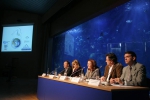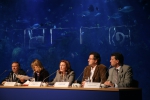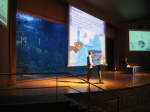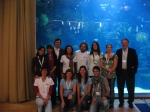



Supporting
Organisations









|
THE VALENCIA DECLARATION
A PLEA FOR THE PROTECTION OF MARINE BIODIVERSITY
Recognising the fundamental importance of marine biodiversity to human well-being,
Concerned that the convergence of global environmental pressures pose critical threats to the
sustainability of marine biodiversity in the oceans,
Acknowledging efforts by many agencies to give increased attention to marine biodiversity, but
aware that the current pace of efforts to protect marine biodiversity is insufficient,
We, the community of scientists engaged in research relevant to marine biodiversity and
ecosystem functioning and ocean management gathered in the City of Arts and Sciences of
Valencia, Spain at the World Congress of Marine Biodiversity, November 2008 agree, on the
basis of the overwhelming scientific evidence presented, that:
- Marine biodiversity and ecosystems are essential to the functioning of our biosphere
and hence to human well-being
- The pace and scale of anthropogenic changes occurring in the oceans and the impact
of these changes on marine biodiversity and ecosystems are cause for grave concern
- When effectively designed, managed and enforced, marine protected areas can deliver
many ecological and socio-economic benefits as well as building the resilience of
marine ecosystems in the face of increasing global pressures
- Emerging human activities, such as geo-engineering of the oceans to mitigate climate
change, may deliver negative impacts to marine ecosystems
- Research efforts to explore marine biodiversity and assess its status are insufficient,
lagging well behind similar effort on terrestrial biodiversity
- To be effective, networks of marine protected areas must be ecologically coherent and
should be embedded in integrated ocean management frameworks that address the
range of human activities and impacts both within and beyond the protected areas
- Deep sea ecosystems differ significantly from coastal ones such that the dynamics of
most deep-sea fish stocks are so fragile and slow to recover that they should be
approached with an exceptionally high degree of precaution
We urge that:
- Integrated ocean management be put in place covering human activities impacting on
marine biodiversity and ecosystems both within and beyond national jurisdiction
- Ecologically coherent networks of marine protected areas be developed at an urgent
and accelerated pace based on existing scientific data and understanding
- Participative management structures be developed, where they do not exist, engaging
those involved in the exploitation of marine living resources with the goal of sustainable
use of marine biodiversity
- Research efforts to explore and better understand marine biodiversity be enhanced and
promoted to provide the knowledge base necessary to underpin an adaptive
management process
- Mechanisms be established to enhance cooperation between scientists, governments
and relevant organizations to identify and protect ecologically and biologically significant
areas based on the scientific criteria adopted by the Parties to the Convention on
Biological Diversity for the open ocean and deep seas
- Deep-sea fisheries be authorised only where evidence has been gathered to
conclusively demonstrate that a stock can be sustainably exploited in full compliance
with FAO Technical Guidelines for deep-sea fishing in the high seas
- The United Nations General Assembly builds on the Law of the Sea and the Convention
of Biological Diversity to achieve an international governance regime for the effective
stewardship of marine areas beyond national jurisdiction and the fair and equitable use
of living resources for the benefit of human kind
Background
Oceanic and coastal marine ecosystems provide a wide range of goods and services that are
fundamental to continued human well-being. All ecosystem services ultimately derive from
ecosystem functions, that is the processes, products or outcomes arising from the interactions
of organisms with their environment activities in the ecosystem. These services are provided on
both the global scale, including the production of oxygen, nutrient cycles, carbon capture
through photosynthesis, and carbon sequestration via the biological pump, as well as on the
regional scale, including the stabilization of coastlines, bioremediation of waste, and a variety of
aesthetic and cultural uses.
In the marine realm, a lower bound estimate of the total economic
value of these ecosystem services indicates that it exceeds by at least two orders of magnitude
the value of the more familiar direct extraction of goods, such as fish and other marine species.
Marine biodiversity underpins the functioning of marine ecosystems and their provision of
services - without biodiversity there would be no ecosystem services. Maintaining biological
diversity is crucial to maintaining ecosystem resilience and thus to the continued provision of
ecosystem services.
Anthropogenic impacts on the oceans are well documented. As summarised by the Secretary
General of the United Nations: “The facts are clear. The world’s seas and oceans are becoming
increasingly tainted by untreated waste water, airborne pollution, industrial effluent and silt from
inadequately managed watersheds. Nitrogen overload from fertilizers is creating a growing
number of oxygen-starved “dead zones in coastal waters across the globe. Moreover, despite
the growing reach and intensity of commercial fishing operations, total global fish catch is
declining.”
These pressures and their synergistic effects cause serious threats to the functioning and
viability of marine ecosystems. Moreover they reduce their ability to adapt to new threats, such
as invasive alien species, climate change and ocean acidification. Rising sea temperatures and
ocean acidification are robustly predicted consequences of increasing greenhouse gases
concentrations in the atmosphere and will impact on the structure and functioning of
ecosystems. Climate change is emerging as a force able to deliver the coupe de grace to the
ocean’s biodiversity.
However, despite wide concern over the health of marine systems and of global fisheries, less
than one percent of the oceans are currently afforded protection. Marine protected areas
(MPAs) are recognised as a powerful tool to sustain the viability of marine biodiversity. Existing
studies indicate that networks of well-managed MPAs can make ecosystems more resilient to
external threats like eutrophication or climate change, can protect valuable habitats, and can
support species that use these habitats for feeding or breeding.
Indeed, government leaders at the World Summit on Sustainable Development (Johannesburg,
2002), the Convention on Biological Diversity (CBD) and the United Nations have committed to
the establishment of marine protected areas consistent with international law and based on
scientific information, including representative networks by 2012. In May, 2008, Parties to the
CBD adopted scientific criteria for the identification of ecologically and biologically significant
areas in the open ocean and deep sea beyond national jurisdiction and guidance for the
development of representative marine protected area (MPA) networks. However, despite
encouraging progress such as the Northwestern Hawaiian Islands National Monument and the
Phoenix Islands Protected Area, Kiribati, progress must be accelerated or the 2012 target will not be
met until 2060, half a century late.
Organizing institutions:
  
  
|









 



|

